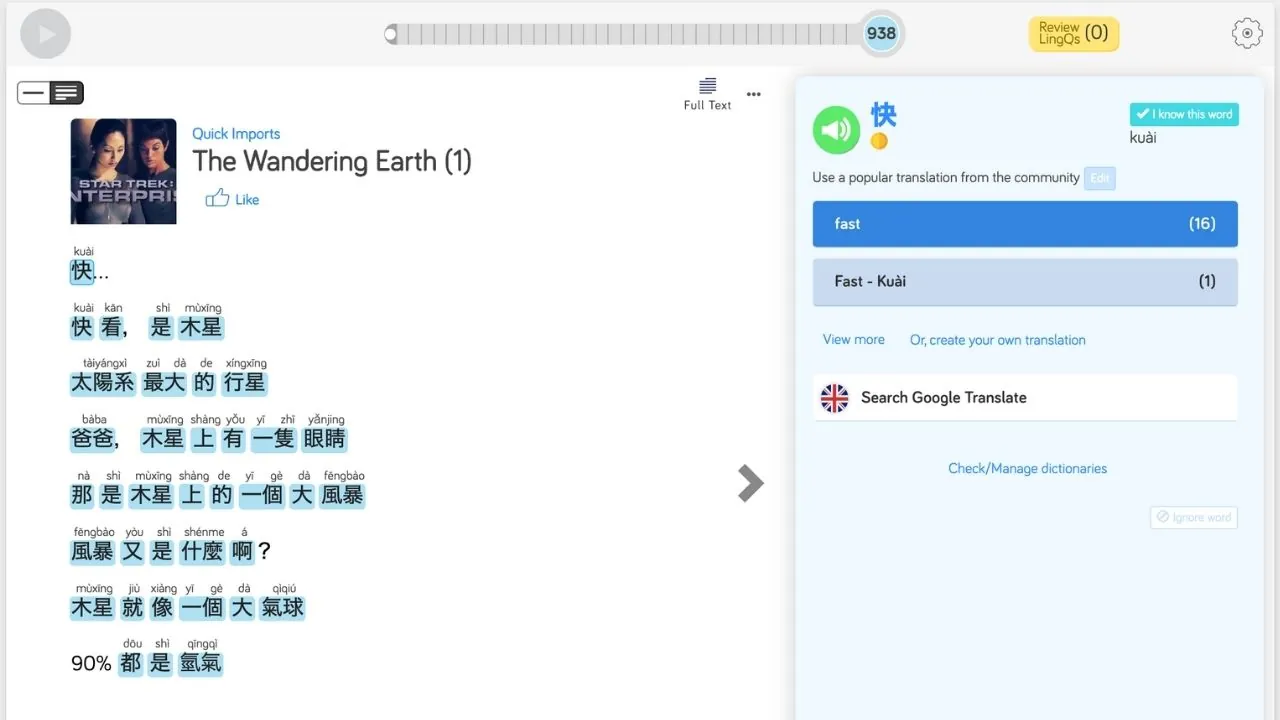Top 10 Ways To Maintain Chinese Language
Hey guys I’m Carl Mclarty of McLarty Films. I’ve been studying Chinese for over 20 years. Now originally I did study formally in universities including UCLA and UH Manoa. After university I lived in China and really internalized it.
The problem is, once you’re not in that environment, how do you keep the language sharp? How do you keep it fresh and gradually let it grow without letting it atrophy and fade away? Which is easy to do with language if you don’t use it every day.
所以现在啊我就是自学。然后,后面我想跟你们分享一下我自学的方法还有小技巧技术什么的。
So I’ve got a list of the top 10 ways that I’ve been able to maintain my Chinese after all these years. These are daily practices that I still use.
#1 Airplane Mode
This one is kind of silly but it is very important. I am strong believer in airplane mode. My phone is one of the biggest sources of distraction that I have. So for me, before I go into my study mode, I always set the phone onto airplane mode. And that just helps me focus.

Another tool I have is using timers. So whether that’s with your watch or your phone or even online with e.ggtimer.com, that’s a good way and so just trying to set your blocks of like 20 minutes is a solid block with zero distractions. So the outside world can’t connect to you and you can’t connect to anything else. That will help you focus and focus is key for everything and in my language study.
#2 LingQ
And this is the big one, I try to do things daily and my biggest habit that I have to get done even if I don’t get anything else done is my LingQ minimum LingQs per day. So I have it set to the very very minimum and I only do 10 LingQs a day. Once you get going and get in there I’m going to double or triple that. But by setting it as a minimum, it has a reward system so you get apples for daily streaks, and believe it or not that works. It gets me motivated to get my daily apple.
LingQ is a website which has been described as the Swiss army knife of language learning and that’s what sold me on it. Someone reviewed the site. I love Swiss army knives and basically it does everything in one place. It mostly focuses on reading and listening. There are a lot of different articles.

There are podcasts. I like to listen to a podcast out of Australia SBS Chinese. There are Chinese people in Australia that have a podcast about cultural differences and then there’s a written transcript and of course the audio with the written transcript. Also there is there’s a built-in online dictionary with everything on LingQ so I use that to save new words as I’m learning and to create or save sentences that I’ve seen before but want to refresh or just new words.
There’s a lot I can talk about LingQ but I’ll leave that for another video.
#3 Google Translate
Number three is Google Translate or other online dictionaries.
For me, Google Translate is something I always have with me on my phone and I use it a lot. So for Chinese and for Spanish sometimes, I will use the translations. I’ll use the audio mode. I speak in English and it will translate into my target language which is Chinese or Spanish.
It’s a really great tool and with Google Translate you can also use the smart camera. I can just hover over a menu or over any Chinese text or even
screenshot a meme with Chinese on it and then it will scan the text in into Google. Once it’s scanned the text into Google Translate, I can pick up new vocab that way. Google Translate is awesome and I’ve done a couple videos on that before where I test the simultaneous translation and it’s really cool.
#4 Radio
So when I Iived in LA before, there was 1300 AM which is a Chinese language show. But right now, in my current location I don’t have Chinese on the AM or FM dial but I do have Spanish. So I listen to Spanish. Anytime I’m in the car it’s on the Spanish channel which means I listen to a lot of Ranchero music. But it’s small price to pay to learn Spanish.
Something that I’ve been experimenting with is using radio apps. You have a lot of online radio and so I’ve been using something called Simple Radio. This app lets you search for radio stations in Chinese or in Spanish anywhere in the world. So you can find stations in Beijing or in Malaysia or in Australia in Chinese Language. It depends on the time zones of which one I listen to, but a lot of times I honestly will still just listen to a Chinese station out of Pasadena California and sometimes Beijing. And then for Spanish, I’ll listen to stuff from Mexico City or Barcelona. Once again it’s called Simple Radio. There are several different apps but that’s the one that I’ve been using and it’s free and it’s good.

Now for speaking I haven’t talked about speaking. So for self-study, of course it’s best to have a friend or a partner to speak in Chinese with but I don’t right now so…
#5 Talk to Yourself
It sounds silly but talking to yourself in Chinese is great. I do it when I run, 慢跑 it’s more of a slow jog. I will talk to myself. It sounds kind of weird but I give myself pep talks in Chinese and it’s kind of a fun way to do it.
Also sometimes in the shower I’ll talk out loud in Chinese or Spanish. Just having a conversation like a cray-cray out loud in Chinese or Spanish is a great way to practice speaking
#6 Call a Real Person On the Phone
Talk to someone on on the phone and if you do just an “old school” phone call in Chinese or Spanish it’s great because you get to reconnect with a friend and just talking without any visual forces you to rely completely on your ears which is good.

I also have friends in China where most people use WeChat so I will do video chats with my friends and that helps. Then zoom is also another option. Zoom is cool because you can record the conversation, first letting the other person know that you’re going to be recording. Talking with a native speaker is your best practice for improving your speaking. If you don’t have friends that you can call on the phone or chat on WeChat or Zoom there’s a paid version and my choice is italki.
On italki you can hire informal tutors but it’s basically just talking to a friend on Skype and they charge you a small fee. I use this for Spanish. I don’t think I’ve used it for Chinese but it’s a great platform for finding a native speaker and you can even choose a city (country) where the person lives to be your tutor.
#7 Record Yourself
Speaking on camera or on mic is a great way for you to hear your problems in speaking. Maybe you will pick up some speech patterns that you like to say in Chinese. You have certain filler words or stuttering words that you use too much that are annoying. This can help correct those problems in your speech.
You can also hear your pronunciation problems. It’s just really good idea to record yourself whether it’s audio or video. For me, I recently started speaking in Chinese on camera for youtube and you know that’s a good test for me to see where I’m at and the problems that I’m having.
If you’d like you can check out my youtube channel here. I have more conversations and tips for studying Chinese and some Spanish stuff on different playlists.
#8 Watch Movies, watch TV, and watch YouTube videos.
I’ve watched all the old Stephen Chow movies. I’ve watched tons and tons of crappy Chinese movies over the years. Nowadays I watch most things on Netflix like everyone else and YouTube.
There is a cool app, well it’s actually a Chrome plugin, called Learn Languages With Netflix or Learn Language With YouTube that I highly recommend. You can have dual subtitles on screen while you’re watching your movies. It comes with some other features and it’s really cool and it’s free.
I use that for studying Spanish and for Chinese. Even if you’re just watching Netflix normally without that, you can turn on your closed captions so you can see the text as you’re watching the movie. Pause the movie so you can pick up some really cool catch phrases. For example, I was just watching one the other day and I learned 时间紧迫. Which means we’re running out of time.That was on a Netflix show called Day Night.
*I should note that I also use a LingQ web browser plugin(Chrome, Safari and Firefox) that allows me to import videos from Netflix or YouTube directly into LingQ and access all the LingQ functions like online dictionaries and vocab review. This way I can search for topics that I am interested in like camera reviews, and turn them into language lessons in LingQ. All the vocabulary you are looking up and learning is also tracked in LingQ so your known words and learned words are all in one place.
Also, LingQ generates an audio file for YouTube videos which you can listen to in your dead time to reinforce this content. The trick with YouTube is to find videos with Chinese closed captions. It is much easier to import Netflix content as all the Chinese shows have CC whereas only a small percentage of Chinese YouTube content has Closed Captions.


#9 Keep a Notebook
I have these cheapo notebooks that I got on Amazon. I’ll just write down whatever interesting words that I have forgotten or want to relearn or want to learn anew.
I had a goal of just having one page per day in Chinese or in Spanish, so two pages a day. And the act of actually writing out Chinese characters helps a lot because then you can revisit the radicals and sometimes just looking at a character as you write it will help you understand the thinking behind the creation of the word from a thousand years ago or five thousand years ago.
So for example, today I was using LingQ to read 繁体字 traditional Chinese which I’m working on this year. Just a simple word 電 meaning, electric used in electric brain or computer. The 電 is really just rain with electricity below it and so as I was looking at that and was breaking down the character. That’s the traditional form, and of course in the new version of 电 after 1949 or whenever they simplified the Chinese, they got rid of the rain. But it is cool to know, the ancients, the first time they saw electricity their whole concept was lightning. So lightning was electricity.
So anyways, writing down the characters is really helpful. You don’t have to do it a lot but just to keep your hand fresh and to keep your characters fresh is important.
#10 Use Chopsticks

So Chinese are always very polite and they always say 你中文讲得怎么那么好. Instead of just saying 哪里哪里 which is standard, You just say something like是因为我吃饺子吃多了or I ate a lot of Jiaozi. So whenever you can, go eat Chinese food. You’re probably going to meet Chinese from all over China.
There are Chinese restaurants everywhere in the world, in every corner. I don’t care where you live, chances are, someone in the restaurant is going to speak Chinese. Right now during COVID- 19 it’s not that convenient, but over all the years I’ve enjoyed talking to chefs and waiters and people in restaurants in Chinese. It’s always a kick because they’re everywhere in the world and not just China. And when you can’t travel you can always go to your neighbourhood Chinese restaurant instead.
That about wraps it up. Thanks for watching. Peace.
Enjoyed this post? Check out polyglot and LingQ cofounder Steve Kaufmann’s blog post to learn about the similarities and differences between learning Korean vs Japanese vs Chinese!

Carl McLarty is a videographer and lifelong language learner.
Connect with Carl on YouTube or Instagram by searching @mclartyfilms


